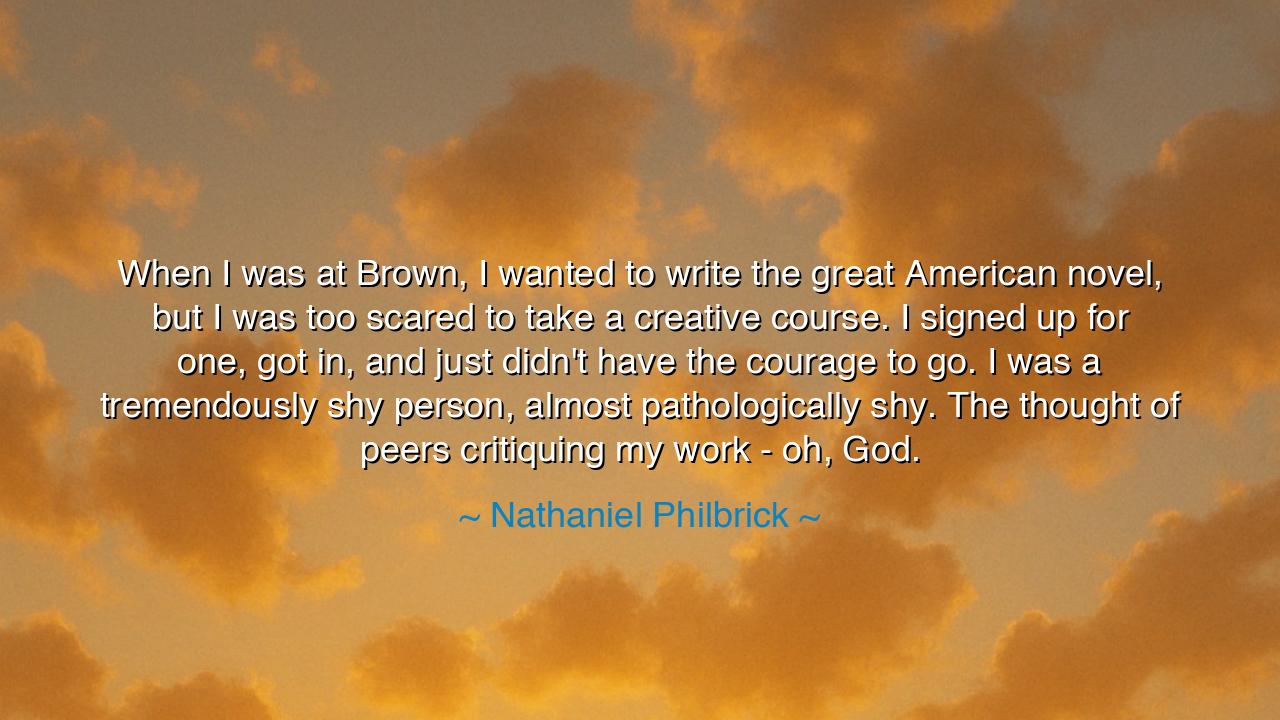
When I was at Brown, I wanted to write the great American novel
When I was at Brown, I wanted to write the great American novel, but I was too scared to take a creative course. I signed up for one, got in, and just didn't have the courage to go. I was a tremendously shy person, almost pathologically shy. The thought of peers critiquing my work - oh, God.






“When I was at Brown, I wanted to write the great American novel, but I was too scared to take a creative course. I signed up for one, got in, and just didn't have the courage to go. I was a tremendously shy person, almost pathologically shy. The thought of peers critiquing my work — oh, God.” Thus spoke Nathaniel Philbrick, the historian and author whose later works would bring history to life for millions. In these humble and honest words, he confesses the secret battle that dwells within all who dream — the war between ambition and fear, between the longing to create and the terror of being judged. He reveals not the weakness of the timid, but the truth of the human heart: that the pursuit of greatness often begins in silence, in hesitation, in the trembling before one’s own potential.
The origin of these words lies in Philbrick’s youth, when he studied at Brown University, filled with the same burning hope that has lit the hearts of all artists since time began — the hope to create something immortal. Yet like many before him, he found himself imprisoned not by lack of talent, but by fear: the fear of exposure, the fear of ridicule, the fear that his work, once seen by others, would not be worthy. Such fear is ancient; it has haunted poets, painters, and thinkers since the dawn of art itself. For to create is to reveal the soul — and to reveal the soul is to risk the wound of rejection.
Nathaniel Philbrick would go on to become one of America’s most respected authors, known for his works of history and narrative mastery, such as In the Heart of the Sea. Yet here, he reminds us that even those who later soar once knelt in the shadows, unsure of their wings. The greatness he sought was not denied by fate — it was delayed by self-doubt. And herein lies the quiet tragedy of many lives: not that destiny refuses us, but that we refuse ourselves before destiny ever has the chance to act.
History offers countless mirrors to this truth. Consider Vincent van Gogh, who painted the very soul of the world but spent his life convinced he was a failure. His genius burned so brightly that it frightened even himself. He sold but one painting in his lifetime, yet today his works are among humanity’s greatest treasures. Or think of Emily Dickinson, who wrote nearly two thousand poems, most of which were never shared in her lifetime because of her own shyness and fear of judgment. Like Philbrick, she too trembled at the thought of critique, yet within that trembling lay the pulse of greatness. Such examples remind us that genius and fear are often twins — born together in the same heart.
What Philbrick’s confession teaches is not that fear is shameful, but that it is universal. Every artist, every dreamer, must confront it. The difference between those who create and those who remain silent is not the absence of fear, but the presence of courage. Courage is not comfort; it is the decision to act despite discomfort. Philbrick’s words capture the moment before the leap — that sacred hesitation when one stands at the edge of possibility. It is a moment we all know: when the voice of creation whispers, and the louder voice of fear replies, “Not yet.”
Yet, his story also reveals hope. For though he could not step into that creative writing class, life was patient with him. The dream he once abandoned returned in another form. Through the study of history, he found his voice — and with it, he found a way to fulfill his early ambition. He did, in time, write works that were great and enduring. The path was not what he expected, but his destiny waited for him until he was ready. This, too, is a lesson: that what is meant for us will not vanish if we are slow to begin, so long as we keep walking toward it.
Therefore, my children, let these words awaken in you both humility and strength. Do not curse yourself for fear, for even the bravest hearts once trembled. But neither let fear rule you, for no dream can blossom in the soil of hesitation. When next you stand before a door that frightens you — whether it be a stage, a page, or the judgment of your peers — remember Nathaniel Philbrick, who once turned away, but later found his courage. Take the step he once feared to take. Share your work, your voice, your truth.
For fear, when faced, becomes the forge of greatness. And as Philbrick’s life shows, the shy may one day become storytellers to nations. Your courage need not be loud; it need only be steadfast. For every act of bravery — no matter how small — brings you closer to the destiny that fear once tried to deny. Courage, then, is not the absence of trembling — it is the act of writing your story anyway.






AAdministratorAdministrator
Welcome, honored guests. Please leave a comment, we will respond soon